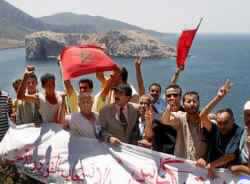The foreign ministers of Spain and Morocco meet face to face on Monday to try to consolidate a weekend truce brokered by the United States over the islet of Perejil. Spain's Ana Palacio will travel to the Moroccan capital Rabat for talks with Mohamed Benaissa that should provide an opportunity for both sides to end the bitterness which culminated in a handful of Moroccan troops occupying Perejil 11 days ago.
Spanish forces ousted the Moroccans in a bloodless raid a few days later, but remained there until Washington strong-armed the two sides into an agreement for the islet to go back to its demilitarized status.
Spain withdrew its troops from Perejil -- Spanish for parsley and known in Morocco as Leila -- on Saturday night, shortly after the deal was announced.
On Sunday, the 30-acre islet off the North African coast had returned to its usual status, uninhabited except for a few grazing goats.
In Madrid, newly-appointed Foreign Minister Palacio met senior diplomats and advisers to discuss the issues that may come up in Rabat on Monday, state radio said.
The list of gripes is long and there are plenty of subjects both may well choose to leave for a later stage. These include fishing rights, the flow of illegal immigration and drugs trafficking over the Straits of Gibraltar, the status of Spain's North African enclaves of Ceuta and Melilla and that of Western Sahara.
Spain's first female foreign minister and appointed just under two weeks ago, Palacio has undergone a baptism of fire with this crisis and will be keen to establish more fluid relations as quickly as possible.
Although their proximity and trade ties mean they are key partners, the dispute is the latest in a long series between the two countries. The current stand-off dates back to October, when Rabat withdrew its ambassador to Madrid.
Spain retaliated last week by recalling its envoy to Morocco.
The first stage in normalizing relations may well be to return those representatives to each country.
Although the agenda for Monday will probably be limited to diplomatic niceties, Morocco eventually has designs on Ceuta and Melilla, which Spain has consistently said are not up for negotiation.
But one political analyst argues that Spain may well be forced to discuss it at a later date.
"The Moroccans are very patient. What are (the Spaniards) going to do when you start getting demonstrations on the border and in Melilla, and there are difficulties about, say, the fishing agreement," said George Joffe, director of the Center of North African Studies at Cambridge University in England.
"They're going to have to negotiate something, even if it's a co-sovereignty deal, like Gibraltar, that's what the Moroccans will say," he added.
Others argue that, as in the past, Madrid will simply refuse and dig its heels in, an attitude which has certainly been behind the estrangement with Rabat in the past.
Britain said earlier this month it would share sovereignty of its colony with Spain, although the idea was instantly rejected by Gibraltarians.
Encouraged by those talks, many see the Moroccan move on Perejil as an attempt to force discussions about Ceuta and Melilla
PHOTO CAPTION
Moroccans celebrate on a cliff next to the disputed Island of Leila-Perejil (top) July 21, 2002, after Spanish troops pulled out. (Desmond Boylan/Reuters)
- Author:
AP - Section:
WORLD HEADLINES


 Home
Home Discover Islam
Discover Islam Quran Recitations
Quran Recitations Lectures
Lectures
 Fatwa
Fatwa Articles
Articles Fiqh
Fiqh E-Books
E-Books Boys & Girls
Boys & Girls  Ramadan
Ramadan Fatwa Audios
Fatwa Audios Month of Mercy
Month of Mercy Women
Women Eed Al- Fitr
Eed Al- Fitr Food Recipes
Food Recipes Videos
Videos

 Prayer Times
Prayer Times












